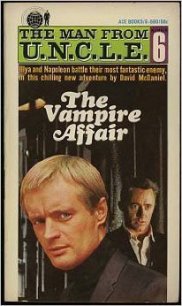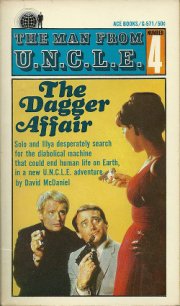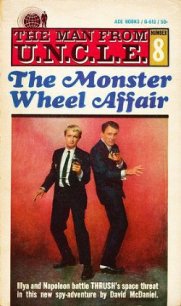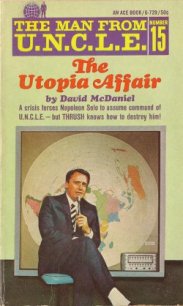The Rainbow Affair - McDaniel David (книги хорошем качестве бесплатно без регистрации .txt) 📗
"Oh no," Aunt Jane said. "This was the residence of a young man - about six feet tall and quite athletic. He had an older man with him, and was quite well off."
Illya sighed. "You were taught that trick by Mr. Escott, weren't you. Go ahead. How can you tell?"
"There are holes in the wall above the sink where a mirror was mounted. Its height indicated the height of its user. The older man had the second room back; he was in the position of a servant, because the younger man had the larger bedroom with the window."
Napoleon and Illya examined the areas she indicated, and Illya looked up first. "He must have either been well off or subject to fluctuations in fortune," he said. "There was no difference at all in the color or texture of the paper where nailholes indicate something was hanging, like a picture."
"Therefore," continued Napoleon without a pause, "he spent all sorts of money making the place livable and then moved out very shortly."
Aunt Jane nodded proudly. "That was quite good. I hadn't noticed that myself - my statement was based on other evidence. You see how your association with him has sharpened your eyes."
Napoleon and Illya looked at each other. Perhaps it was so - they hoped it was.
Monday blew up cloudy and cold. It started to rain around noon, while Napoleon and Illya were down at the dock making sure all their gear was safely stowed. They sealed the last box and hurried back up the street to Joey's house. There they had a hearty lunch and lay down for a few more hours' sleep before the long night ahead.
It was dark when they awoke, and Joey had supper ready for them. The storm was higher, and wind muttering around the house like an animal. They ate again, light, rich food which would keep them going through the cold without overloading their stomachs.
They spent nearly half an hour getting dressed for the excursion, from warm undergarments out through several layers to the waterproofs they slipped on over the entire ensemble. A last steaming cup of tea, and they were ready to go.
Two electric torches lighted their way down to the sheltered harbor, where the waves, even with force abated, tossed their craft from side to side, bouncing against the pilings and tugging at her moorings.
Illya looked at his partner and shook his head. "The storm is getting worse," he said. "Only an idiot would go out in an open boat on a night like this."
"I know," said Napoleon. "You ready?"
"Of course."
The waterfront was deserted in the storm, and alone the U.N.C.L.E. agents rigged the boat and cast off. Napoleon pushed the dock away with a small spar at the crest of one wave, and hauled up the single jib sail they would use. Illya hung on the rudder as he had been instructed, and the wind caught them up and hurled them from the shore.
It took some work to keep them from the end of the breakwater, but shouted instruction and bruised hands brought them clearly past the rain-dimmed lighthouse into the sweep of the open sea.
The wind was steady, here, and in a matter of minutes Napoleon had them so rigged that it bore them along, heading crabwise towards a particular compass setting. Rain slashed at the deck and tore at their foul-weather gear, which was earning its name. The tiller had been lashed, and Illya had nothing to do but hold on, and adjust the lines from time to time. Holding on still took most of his attention.
Napoleon was up at the prow where the jib was belayed, one hand on a cleat and the other on the rope, keeping the sail trimmed as the slamming waves against her hull tried to force her to fall away from her true course. He was really at home on a somewhat smaller boat, but he adjusted his touch and had the craft under good control for all her bucking. Boiling waves swept up around him and tore at his legs as they raced across the deck. The salt spray stung his eyes and chilled his exposed face, and the sharp tang of it tasted in the back of his mouth. He leaned back on a fixed line and looked for Illya.
The Russian was holding onto the starboard rail with both hands, facing away from the wind, kneeling on the hard bench that ran around the inside of the cockpit. The tiller was securely fastened at the proper angle, but the wind was beginning to shift again.
Napoleon shouted his partner's name, and Illya straightened at once. "Aye aye, Captain," floated back over the howl of the wind.
"Stand by the tiller," Napoleon told him as he made his way aft. "The wind's turning."
Illya bent over the long handle and released one of the lines that held it, letting the rudder back easily, though it threatened to wrench itself out of his grip. Napoleon refastened the line on the lee side while Illya tied down the other, then leaped, or more accurately scrambled precariously, back to his position at the bow. The jib had to be adjusted.
On the way he took a quick look at the inertial guidance device whose glowing display showed through the spray-splattered glass plate. They had come about a quarter of the way to the island, and were essentially on course. Napoleon checked his repeated compass, and returned to the prow.
At the far end of the boat, Illya crouched in a cockpit that was regularly filled with water and drained, several times a minute. The stern, sturdy with flotation tanks, seemed to bounce about more than the rest of the boat, and he was holding on with his eyes shut against the driving wind-blown salt whipped in froth off the tops of the leaping waves and flung in his face by the storm. The tiller fought viciously against the ropes that held it, bucking and straining against them as the boat strove to hold its course. A few degrees either way in this blindness could land them in Wales, if they held up that long under the hammering the Bristol Channel was giving them - or out in the Irish Sea, where the full fury of the storm swept down over open water for a hundred miles.
He had nothing against boats, certainly; his naval training had left him quite accustomed to them. But it had also taught him the folly of attempting such a passage in rough weather - if rough was quite the word he wanted. Only his sincere faith in the incredible luck of Napoleon Solo convinced him they could make the crossing. He had been with Napoleon long enough to know what kind of long chances he could take and still come out on top.
Napoleon, meanwhile, didn't care. Even the goal of the little island of Donzerly where they were bound shrank to a small corner of his mind. His whole concentration was focused on his personal, physical struggle with the wind for the mastery of the boat.
Now there was a stout rope tied around his waist and securely belayed to a sunken cleat, lessening the danger slightly. Still the storm whipped about him, pulling and throwing him from side to side. This, he thought, was really his element, battling nature with only a stout ship and his own skill between him and disaster. Even his stomach was holding up well, considering the beating it was getting. He wasn't sure how Illya was doing, astern.
Neither was Illya. The world had resolved into two simple bits of awareness - the rudder must be kept set, and remember which is the downwind rail. Time lost its identity, and was blown away by the endless howl of the wind and the slashing of the silver-dagger rain. It could have been an hour or six months before he became aware of Napoleon calling his name again.
During this period, Napoleon too lost track of reality to some extent. Shaken, bruised, pounded by wind and wave for another indefinite length of time, he gradually heard something over the noise of the storm. So faint and blown-about was the sound, fading beyond the range of hearing from moment to moment, he wasn't sure whether it was his imagination. But then he heard it again, a little louder. The sound bellowed against the night that surrounded it, bellowed and fell away as it paused for breath, then bellowed forth again. The deep distant note cut through under the sounds of rain and wind, and it grew as it sounded again.




